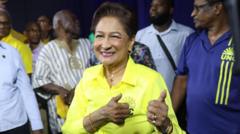In a dramatic turn of events, the opposition party in Trinidad and Tobago, the United National Congress (UNC), has captured a significant victory in the recent parliamentary elections. Preliminary results indicate that Kamla Persad-Bissessar, who previously served as prime minister from 2010 to 2015, is poised to take office once more. This victory comes after a challenging period for the UNC, following their defeats in the last two elections against the incumbent People's National Movement (PNM).
Opposition Triumphs in Trinidad and Tobago's Parliamentary Elections

Opposition Triumphs in Trinidad and Tobago's Parliamentary Elections
The United National Congress celebrates a significant electoral victory, leading Kamla Persad-Bissessar to reclaim the prime minister's office.
The electoral campaign focused heavily on pressing issues such as wage increases and job creation, resonating with the electorate who have been grappling with economic hardships. Supporters of the UNC celebrated well into the night following the announcement of the results. PNM leader Keith Rowley openly conceded the election, acknowledging the disappointing outcome for his party.
Rowley, who had been serving as prime minister since 2015, had recently stepped down, handing the role to Stuart Young. However, Young's decision to call a snap election shortly after his appointment sparked controversies regarding the electoral process. As the country continues to face rising crime rates and an ongoing economic downturn, the state's previous declaration of a state of emergency highlighted the urgent challenges at hand.
In her victory speech, Persad-Bissessar emphasized her commitment to the public sector, stating her primary objectives include safeguarding pension funds for the elderly, implementing wage increases for public workers, and reopening the children's hospital. She also underlined her dedication to ensuring equitable opportunities for all citizens, declaring, "when UNC wins, everybody wins." The political landscape of Trinidad and Tobago is set to change dramatically as the UNC prepares to take the lead in addressing the nation’s pressing issues.
Rowley, who had been serving as prime minister since 2015, had recently stepped down, handing the role to Stuart Young. However, Young's decision to call a snap election shortly after his appointment sparked controversies regarding the electoral process. As the country continues to face rising crime rates and an ongoing economic downturn, the state's previous declaration of a state of emergency highlighted the urgent challenges at hand.
In her victory speech, Persad-Bissessar emphasized her commitment to the public sector, stating her primary objectives include safeguarding pension funds for the elderly, implementing wage increases for public workers, and reopening the children's hospital. She also underlined her dedication to ensuring equitable opportunities for all citizens, declaring, "when UNC wins, everybody wins." The political landscape of Trinidad and Tobago is set to change dramatically as the UNC prepares to take the lead in addressing the nation’s pressing issues.





















